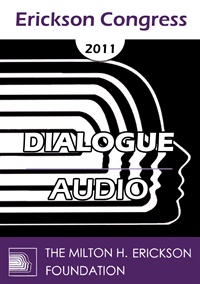
- Average Rating:
- Not yet rated
- Topic Areas:
- Anxiety | Depression | Dialogues
- Categories:
- Erickson Congress | Erickson Congress 2011
- Faculty:
- Carolyn Daitch, PhD | Reid Wilson, PhD | Michael Yapko, PhD
- Duration:
- 1:02:02
- Format:
- Audio Only
- Original Program Date:
- Dec 10, 2011
- Short Description:
- IC11 Dialogue 08 – Comorbid Anxiety and Depression – Carolyn Daitch, PhD, Reid Wilson, PhD, and Michael Yapko, PhD
- Price:
- $15.00 - Base Price
Tags: Anxiety Depression
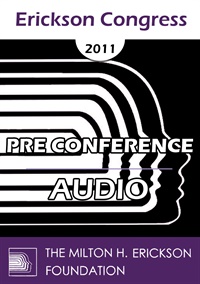
- Average Rating:
- Not yet rated
- Topic Areas:
- Anxiety | Pre-Conference Sessions | Strategic Therapy
- Categories:
- Erickson Congress | Erickson Congress 2011
- Faculty:
- Reid Wilson, PhD
- Duration:
- 5:25:01
- Format:
- Audio Only
- Original Program Date:
- Dec 08, 2011
- Short Description:
- We will begin by studying how all anxiety disorders generate an absolute standard for certainty and com-fort, thus manipulating people into worry. You will learn specific skills within the three targets of treatment for both worry and GAD: physiological, cognitive, and behavioral. Then we will explore strategies for panic, social anxiety, phobias and OCD, helping clients find the courage and motivation to challenge their old beliefs and attitudes. Cutting-edge treatment now pushes further into the confrontational. You will learn how to help clients purposely seek out anxiety as their ticket to freedom from crippling fear.
- Price:
- $15.00 - Base Price
Tags: Anxiety Strategic Therapy

- Average Rating:
- Not yet rated
- Topic Areas:
- Short Courses | Pain and Healing | Self-Hypnosis | Affect | Anxiety
- Categories:
- Erickson Congress | Erickson Congress 2011
- Faculty:
- Jeanne Hernandez
- Duration:
- 1:32:01
- Format:
- Audio Only
- Original Program Date:
- Dec 09, 2011
- Short Description:
- Guide your patients in self-relational, self-hypnotic intra-body conversations to self-manage their chronic pain and suffering. Patients will learn to compassionately listen to pain signals as distinct from self and body, and to proactively respond in self-supportive and soothing ways. The process is also effective for affect and anxiety management.
- Price:
- $15.00 - Base Price
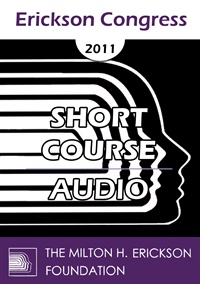
- Average Rating:
- Not yet rated
- Topic Areas:
- Short Courses | Hypnosis | Brief Therapy | Hypnotherapy | Anxiety | Cognitive Behavior Therapy (CBT) | Depression
- Categories:
- Erickson Congress | Erickson Congress 2011
- Faculty:
- Assen Alladin, PhD
- Duration:
- 1:32:25
- Format:
- Audio Only
- Original Program Date:
- Dec 09, 2011
- Short Description:
- There is growing evidence for an additive effect when hypnosis is combined with brief therapies in the management of various emotional disorders. This workshop will describe Cognitive Hypnotherapy, an innovative integrated approach to brief psychotherapy that systematically combines hypnotic techniques with CBT in the management of various emotional disorders to enhance treatment outcome and prevent relapse. This course will be invaluable to therapists who wish to broaden their skills in the management of emotional disorders.
- Price:
- $15.00 - Base Price
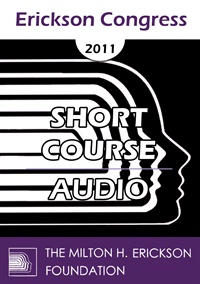
- Average Rating:
- Not yet rated
- Topic Areas:
- Consciousness | Short Courses | Anxiety | Depression | Post-Traumatic Stress Disorder (PTSD) | Therapist Development
- Categories:
- Erickson Congress | Erickson Congress 2011
- Faculty:
- Virgil Hayes, DO
- Duration:
- 1:08:15
- Format:
- Audio Only
- Original Program Date:
- Dec 09, 2011
- Short Description:
- Consciousness can be defined as increased awareness. Simply put it is, “seeing a bigger picture.” The more you understand yourself, the easier it is to understand other. AN individual’s consciousness is the “x” factor in therapeutic encounters. The short course with lecture and case discussions is useful to all skill levels. Non-pathological understandings and co-created solution for anxiety, depression, and PTSD are included in case discussions.
- Price:
- $15.00 - Base Price
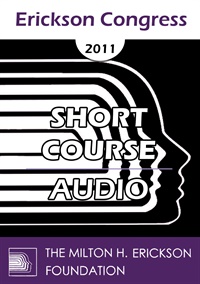
- Average Rating:
- Not yet rated
- Topic Areas:
- Anxiety | Short Courses | Ericksonian Hypnosis and Therapy Techniques | Hypnotic Phenomena | Brief Therapy | Utilization
- Categories:
- Erickson Congress | Erickson Congress 2011
- Faculty:
- Antonio Bustillo, PhD
- Duration:
- 1:26:29
- Format:
- Audio Only
- Original Program Date:
- Dec 09, 2011
- Short Description:
- IC11 Short Course 37 - The Use of Hypnotic Phenomena for Test Anxiety: Brief Ericksonian Solutions at Work - Antonio Bustillo, PhD This is a clinical presentation of a five step model for tailoring hypnotherapy interventions in test anxiety cases utilizing the client’s spontaneous trance phenomena, allowing the clinician’s ability to utilize and maximize the client’s internal resources based on his/her total life experience. Clinical cases will be presented of this hands-on approach of Erickson’s utilization philosophy.
- Price:
- $15.00 - Base Price
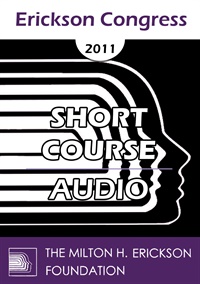
- Average Rating:
- Not yet rated
- Topic Areas:
- Short Courses | Hypnosis | Mind-Body | Hypnotherapy | Anxiety | Depression | Eating Disorders
- Categories:
- Erickson Congress | Erickson Congress 2011
- Faculty:
- Brigitta Loretan-Meier, MS
- Duration:
- 1:33:20
- Format:
- Audio Only
- Original Program Date:
- Dec 09, 2011
- Short Description:
- Irritable Bowel Syndrome (IBS) is one of the most common gastrointestinal disorders. This presentation explains an interdisciplinary approach to dealing with serious problems of IBS-patients. We learn that there are multiple expectations and needs of the clients with a high level of dysfunctional symptoms, as well as multiple stress factors, anxiety and depression. How to regain a better quality of life scores? The importance of focusing the invisible, the affective part of the IBS difficulties is complicated. While setting realistic goals, a new approach leads to body self-regulation with different bodywork techniques and hypnotherapeutic strategies.
- Price:
- $15.00 - Base Price
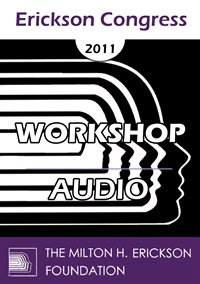
- Average Rating:
- Not yet rated
- Topic Areas:
- Anxiety | Workshops | Children and Adolescent Therapy
- Categories:
- Erickson Congress | Erickson Congress 2011
- Faculty:
- Lynn Lyons, LICSW
- Duration:
- 59 Minutes
- Format:
- Audio Only
- Original Program Date:
- Dec 07, 2011
- Short Description:
- Families dealing with an anxious child often unknowingly “help” their child by doing the very things that make anxiety stronger. This workshop will give clinicians strategies that, from the very first session, show parents and children how to identify and interrupt the cognitive, behavioral, and physiological patterns of anxiety in children.
- Price:
- $20.00 - Base Price
Tags: Adolescents Anxiety Children

- Average Rating:
- Not yet rated
- Topic Areas:
- Clinical Demonstrations | Anxiety | Hypnosis
- Categories:
- Erickson Congress | Erickson Congress 2015
- Faculty:
- Lynn Lyons, LICSW
- Course Levels:
- Master Degree or Higher in Health-Related Field
- Duration:
- 01:06:00
- Format:
- Audio and Video
- Original Program Date:
- Dec 12, 2015
- Short Description:
- Treating anxiety with hypnosis often focuses on relaxation and calmness; and while physiological regulation is an important anxiety-managing skill, hypnotic interventions with anxious clients offer rich opportunities to shift the relationship and responses people have to anxiety and worry. Hypnosis can introduce important cognitive skills that interrupt the process of worry and anxiety while creating an experience of malleability.
- Price:
-
Sale is $29.00
price reduced from Base Price - $59.00
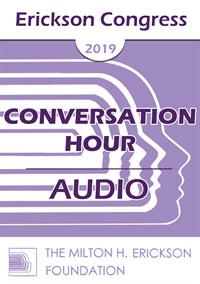
- Average Rating:
- Not yet rated
- Topic Areas:
- Conversation Hours | Anxiety | Children and Adolescent Therapy
- Categories:
- Erickson Congress | Erickson Congress 2019
- Faculty:
- Lynn Lyons, LICSW
- Duration:
- 1 Hour
- Format:
- Audio Only
- Original Program Date:
- Dec 14, 2019
- Short Description:
- Many clinicians focus on breathing, calming, or other distraction techniques when dealing with anxious children. However, focusing on "getting rid of the worry" often backfires, and leaves children and teens feeling more hopeless than engaged. But, when we use short "relaxation" practices with children to shift their patterns and beliefs--when we use this time of focus to deliver and seed valuable information--we create great opportunities for change, engagement, and skill-building. In this hour, I'll describe the tricks to getting the most out these exercises, without stepping into the trap of elimination.
- Price:
- $15.00 - Base Price
Tags: Adolescents Anxiety Children
Please wait ...

